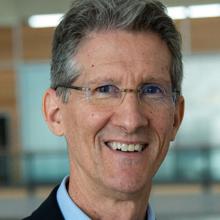
Jim Carrington is president and Chief Executive Officer of the Donald Danforth Plant Science Center and leads the Center in delivering on its mission to improve the human condition through plant science. With nearly 450 employees, the Danforth Center is the largest independent plant science institute in the world.
Since joining the Danforth Center in 2011, Jim has focused the enterprise around high technology, big data, and computation. This will be necessary to feed and power a growing, changing world, while also preserving the environment and vital natural resources.
Through attracting interactive teams of scientists and developing unique platforms to discover underlying principles about how plants work, he has helped the Danforth Center develop more productive, sustainable crops. It has also made it possible to partner with organizations that are best positioned to solve problems where they exist around the world.
Jim is one of the most frequently cited plant scientists in the world. He is recognized for his research on gene silencing, small RNA, and virus-host interactions. His work in the small RNA field has focused on mechanisms through which plants and other organisms use non-coding RNA to control growth and development and to defend against viruses. He is applying this knowledge to improve productivity of food security crops.
Jim was elected as a member of the National Academy of Sciences in 2008. His awards include the Presidential Young Investigator Award from the National Science Foundation, the Ruth Allen Award from the American Society for Phytopathology, and the Humboldt Research Award from the Alexander von Humboldt Foundation. He is a fellow of the American Academy of Microbiology, the American Phytopathological Society, and the American Association for the Advancement of Science.
Prior to joining the Danforth Center, Jim served as director of the Center for Genome Research and Biocomputing (CGRB), the Stewart Professor for Gene Research, and Distinguished Professor of Botany and Plant Pathology at Oregon State University. He received his bachelor’s degree in plant science from the University of California, Riverside, and doctorate in plant pathology from the University of California, Berkeley.

